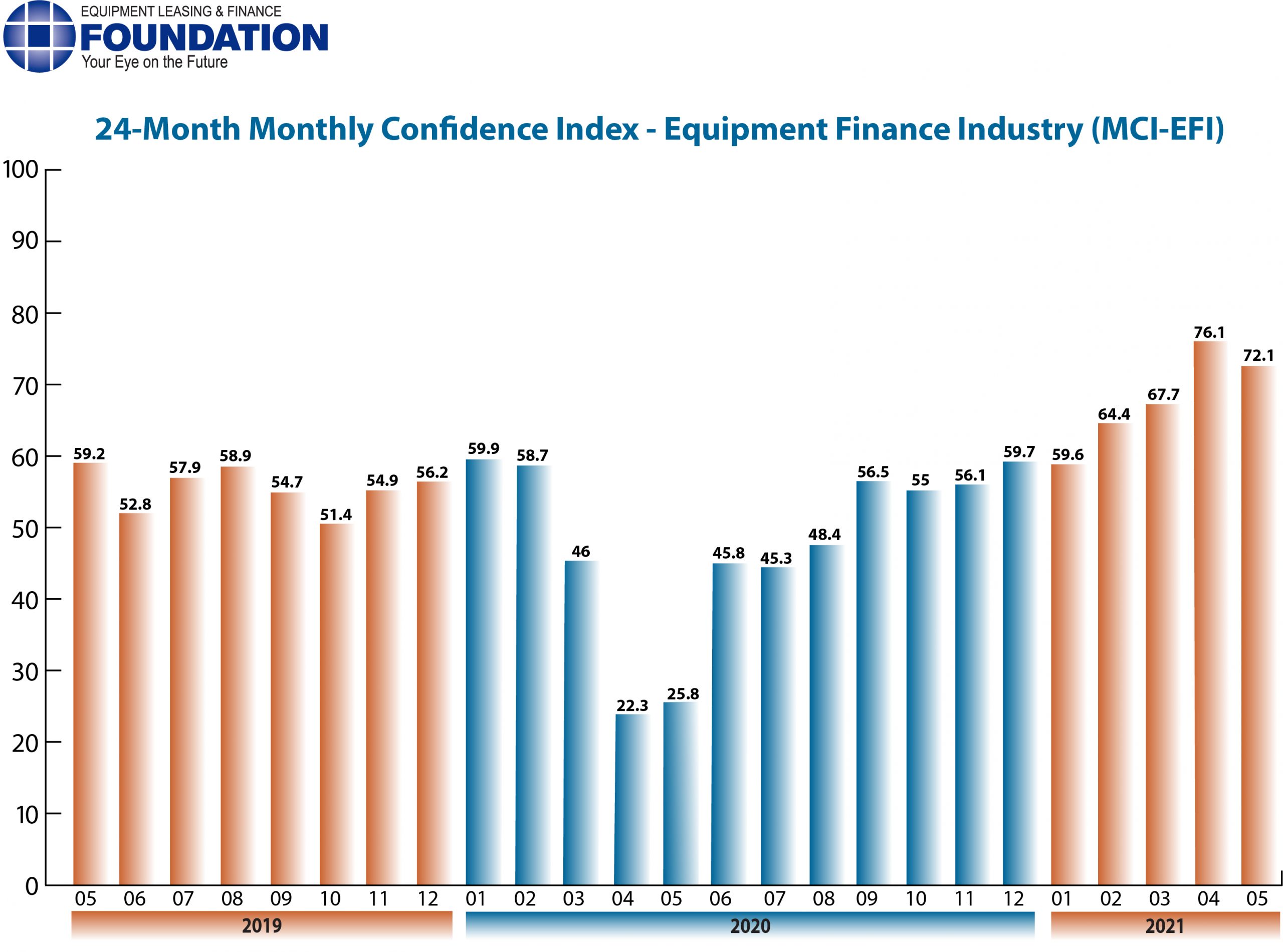
Washington, DC, May 20, 2021 – The Equipment Leasing & Finance Foundation (the Foundation) releases the May 2021 Monthly Confidence Index for the Equipment Finance Industry (MCI-EFI) today. The index reports a qualitative assessment of both the prevailing business conditions and expectations for the future as reported by key executives from the $900 billion equipment finance sector. Overall, confidence in the equipment finance market is 72.1, easing from April’s all-time high of 76.1.
When asked about the outlook for the future, MCI-EFI survey respondent Bruce J. Winter, President, FSG Capital, Inc., said, “While vaccine ‘herd immunity’ may be unachievable, warmer weather, immunity provided by previous infections and over 105 million Americans fully vaccinated will allow most economic activity to resume at pre-pandemic levels this summer. Business owners are much more optimistic and stimulus supported capital spending will likely reach unprecedented levels in the next 12 months. Prolonged inflation risk is a real concern as this untested experiment in rapidly expanding government debt will reach new highs.”
May 2021 Survey Results
The overall MCI-EFI is 72.1, a decrease from the April index of 76.1.
- When asked to assess their business conditions over the next four months, 53.6% of executives responding said they believe business conditions will improve over the next four months, down from 73.3% in April. 46.4% believe business conditions will remain the same over the next four months, up from 23.3% the previous month. None believe business conditions will worsen, down from 3.3% in April.
- 53.6% of the survey respondents believe demand for leases and loans to fund capital expenditures (capex) will increase over the next four months, down from 70% in April. 46.4% believe demand will “remain the same” during the same four-month time period, an increase from 30% the previous month. None believe demand will decline, unchanged from April.
- 32.1% of the respondents expect more access to capital to fund equipment acquisitions over the next four months, down from 43.3% in April. 67.9% of executives indicate they expect the “same” access to capital to fund business, an increase from 56.7% last month. None expect “less” access to capital, unchanged from the previous month.
- When asked, 39.3% of the executives report they expect to hire more employees over the next four months, down from 43.3% in April. 60.7% expect no change in headcount over the next four months, an increase from 56.7% last month. None expect to hire fewer employees, unchanged from April.
- 10.7% of the leadership evaluate the current U.S. economy as “excellent,” a decrease from 13.3% the previous month. 89.3% of the leadership evaluate the current U.S. economy as “fair,” up from 80% in April. None evaluate it as “poor,” down from 6.7% last month.
- 60.7% of the survey respondents believe that U.S. economic conditions will get “better” over the next six months, a decrease from 73.3% in April. 39.3% indicate they believe the U.S. economy will “stay the same” over the next six months, an increase from 23.3% last month. None believe economic conditions in the U.S. will worsen over the next six months, down from 3.3% the previous month.
- In May 53.6% of respondents indicate they believe their company will increase spending on business development activities during the next six months, up from 46.7% last month. 42.9% believe there will be “no change” in business development spending, a decrease from 53.3% in April. 3.6% believe there will be a decrease in spending, up from none last month.

May 2021 Survey Comments from Industry Executive Leadership
Bank, Middle Ticket
“We are seeing demand increase for capital expenditures, especially large facility expansions. Material and labor cost increases are requiring customers to sharpen the pencil to ensure investments remain prudent.” Michael Romanowski, President, Farm Credit Leasing
Independent, Large Ticket
“Near-term the high level of liquidity generally available will continue to drive investor demand in our primary sectors. A major concern over the short to intermediate term is the potential inflationary impact associated with that along with corresponding market pressures which may adversely impact interest rates.” Glenn Davis, President and CEO, RESIDCO
Back to Top